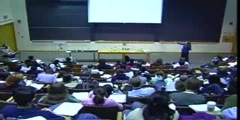Lec 1 - How Do You Know?
"Lec 1 - How Do You Know?" Freshman Organic Chemistry (CHEM 125) Professor McBride outlines the course with its goals and requirements, including the required laboratory course. To the course's prime question "How do you know" he proposes two unacceptable answers (divine and human authority), and two acceptable answers (experiment and logic). He illustrates the fruitfulness of experiment and logic using the rise of science in the seventeenth century. London's Royal Society and the "crucial" experiment on light by Isaac Newton provide examples. In his correspondence with Newton Samuel Pepys, diarist and naval purchasing officer, illustrates the attitudes and habits which are most vital for budding scientists - especially those who would like to succeed in this course. The lecture closes by introducing the underlying goal for the first half of the semester: understanding the Force Law that describes chemical bonds. 00:00 - Chapter 1. Introduction: Logistics 05:37 - Chapter 2. The Goals of Freshman Organic Chemistry: How Do You Know? 15:17 - Chapter 3. Bacon's Instauration: Experimentation over Philosophy 30:17 - Chapter 4. How to Succeed in Chem 125: Following Samuel Pepys 41:56 - Chapter 5. Atoms, Molecules, and Hooke's Law Complete course materials are available at the Open Yale Courses website: http://open.yale.edu/courses This course was recorded in Fall 2008.
Video is embedded from external source so embedding is not available.
Video is embedded from external source so download is not available.
Channels: Chemistry (General)
Tags: Yale Open Yale Courses organic chemistry Lewis structures waves bonds electron atoms reactivity Earnshaw orbital isomers molecular Boltzmann entropy Berzelius Liebig Wohler carbon enantiomers valence proton
Uploaded by: yalefreshorganic ( Send Message ) on 05-09-2012.
Duration: 46m 41s
Here is the next lecture for this course
Lec 2 - Force Laws, Lewis Structures and ...
50:13 | 2883 viewsLec 21 - Berzelius to Liebig and Wöhler ...
49:22 | 3134 viewsLec 6 - Seeing Bonds by Electron Differen ...
51:10 | 3082 viewsLec 9 - Chladni Figures and One-Electron ...
49:36 | 2824 viewsLec 36 - Bond Energies, the Boltzmann Fac ...
47:51 | 3530 viewsLec 12 - Overlap and Atom-Pair Bonds
50:35 | 2752 viewsLec 15 - Chemical Reactivity: SOMO, HOMO, ...
47:12 | 3037 viewsLec 17 - Reaction Analogies and Carbonyl ...
41:44 | 2935 viewsLec 23 - Valence Theory and Constitutiona ...
48:47 | 3192 viewsLec 35 - Understanding Molecular Structur ...
48:42 | 3370 viewsLec 11 - Orbital Correction and Plum-Pudd ...
49:27 | 2900 viewsLec 25 - Models in 3D Space (1869-1877); ...
49:02 | 2821 viewsLec 100 - Lewis Electron Dot Structures
02:03 | 3076 viewsChemical Science -Transition Metals - Lec ...
50:39 | 17547 viewsLec 4 - Coping with Smallness and Scannin ...
50:02 | 2821 viewsNo content is added to this lecture.
This video is a part of a lecture series from of Yale















